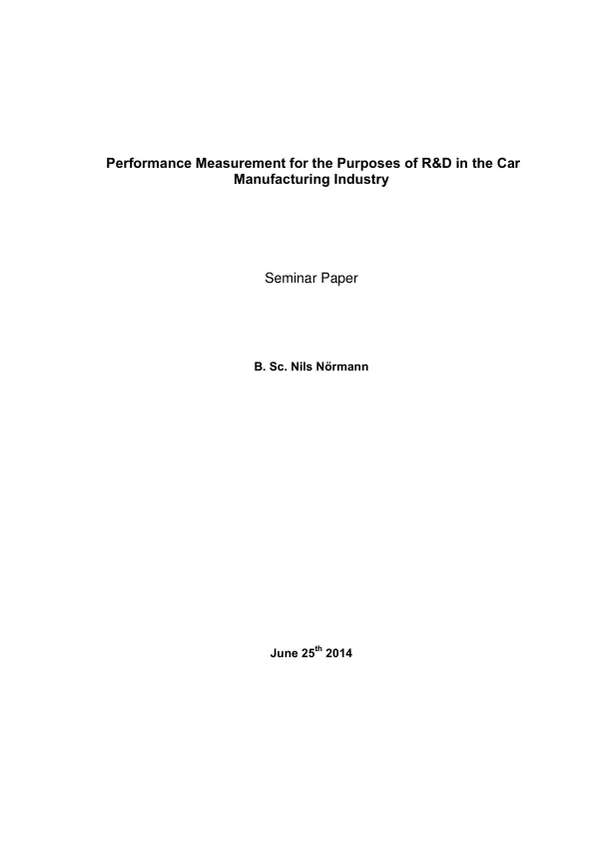Encouraged by an increasing globalization, the car manufacturing industry expanded to growing markets such as China, which is with about a demand of 19.3 million vehicles in 2013 the biggest market in the world. Due to the different habits of customers’ worldwide and changing laws there is a high demand for innovations of alternative fuel vehicles, lightweight materials and connectivity.
In order to provide alternative mobility concepts, efficient and comprehensive technology, the European car manufacturing industry invested over 32 billion Euros into Research and Development (R&D) in 2012. This investment is around 25% of the total R&D spending in the European Union. These investments demonstrate the importance of developing new products in the car manufacturing industry to obtain a competitive position in the global market. To ensure the profitability of developing projects it is important to keep balance between creativity during the innovation process and costs. Controlling helps the management to keep this balance and to measure the performance of new development projects. Therefore, performance measurement can be used.
Inhaltsverzeichnis (Table of Contents)
- 1. Introduction
- 1.1 Initial Situation and Statement of the Problem
- 1.2 Objectives and Approach
- 2. Performance Measurement in Car Manufacturing Industry
- 2.1 Literature Review of Performance Measurement
- 2.2 Performance Measurement in Car Developing Projects
- 3. Criteria for Car Development Projects within the BSC
- 3.1 The Balanced Scorecard
- 3.2 Performance Criteria for R&D in the Car Manufacturing Industry
- 3.3 Applying the customized BSC to the Volkswagen Group strategy
- 4. Conclusion
- 4.1 Summary
- 4.2 Critical Appraisal and Outlook
Zielsetzung und Themenschwerpunkte (Objectives and Key Themes)
This seminar paper aims to analyze performance measurement methods within the car manufacturing industry, focusing on research and development (R&D) projects. The paper investigates the applicability of the Balanced Scorecard (BSC) framework to assess the performance of car development projects and explores how this framework can be adapted to the specific needs of the Volkswagen Group.
- Performance measurement in the car manufacturing industry
- The role of R&D in the car manufacturing industry
- The Balanced Scorecard framework and its application to performance measurement
- Performance criteria for car development projects
- Adapting the BSC to the specific needs of the Volkswagen Group
Zusammenfassung der Kapitel (Chapter Summaries)
- Chapter 1: Introduction - This chapter sets the scene by introducing the current challenges and issues faced by the car manufacturing industry in relation to performance measurement, particularly regarding R&D. It outlines the objectives and the approach taken in the paper.
- Chapter 2: Performance Measurement in Car Manufacturing Industry - This chapter examines the existing literature on performance measurement within the car manufacturing industry, highlighting the key methodologies and challenges. It explores the specific aspects of performance measurement that are relevant to car development projects.
- Chapter 3: Criteria for Car Development Projects within the BSC - This chapter delves into the Balanced Scorecard framework, explaining its principles and components. It then discusses the specific performance criteria that can be applied to R&D projects in the car manufacturing industry, including financial, customer, internal process, and learning and growth perspectives. The chapter concludes by exploring how the BSC can be customized and applied to the Volkswagen Group's specific strategic goals.
Schlüsselwörter (Keywords)
This seminar paper focuses on performance measurement, R&D, car manufacturing, the Balanced Scorecard, performance criteria, strategy, and the Volkswagen Group.
Frequently Asked Questions
What is the main objective of this paper on the car industry?
The paper analyzes performance measurement methods for research and development (R&D) projects in the car manufacturing industry.
Why is R&D performance measurement crucial for car manufacturers?
Due to high investment costs (over 32 billion Euros in Europe in 2012) and the need to balance innovation with cost efficiency to remain competitive.
Which management framework is specifically explored in the paper?
The Balanced Scorecard (BSC) framework and its application to R&D projects.
How is the framework applied to a real-world example?
The paper explores how a customized BSC can be adapted to the specific strategy of the Volkswagen Group.
What are the key performance criteria discussed?
Criteria include financial perspectives, customer habits, internal processes, and learning and growth related to car development.
- Citar trabajo
- Nils Nörmann (Autor), 2014, Performance Measurement for the Purposes of R&D in the Car Manufacturing Industry, Múnich, GRIN Verlag, https://www.grin.com/document/301913



